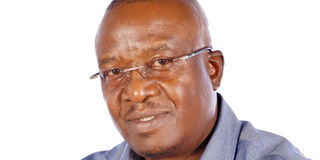Prime
Reflections on a January day: Two liberations and an appointment

Prof Sejjaaka is country team leader at Abacus Business School.
What you need to know:
This week, after an interlude of 36 years, I was appointed chairman of the board of Monitor
I am writing this on January 25 and I am remembering two events that are indelibly etched in our history, albeit which the majority of Ugandans living today never witnessed. I too only witnessed them in the context of a bystander, rather than as an actor. You the reader may be able to reflect on their uncanny resemblance and how far we have come.
The first January day of my reflections was a Monday morning. To be precise it was January 25, 1971. I had just woken up to take a bath and get ready for school. But mother had not prepared breakfast, nor was my school uniform ready. My father was glued to the radio, trying to decipher what was going on. A few neighbours gathered outside and started gossiping. There had been a coup and Milton Obote had been overthrown. My mother claimed she had the sounds of mortar fire in the night. It was like someone was trying to kick start a motorcycle that just couldn’t start.
Later, the coup was confirmed. Idi Amin and his henchmen gave 18 grievances for overthrowing Obote. These included curtailment of freedom of speech and expression, breakdown of law and order, material and political corruption within the ruling elite, economic hardship among large sections of the population, general neglect of the armed forces and tribalistic manipulation within the army! The soldiers decreed that they would be in power for five years after which elections would be held.
Amin then proceeded to dismantle the State and visit terror on Ugandans over the next eight years of his rule. Asians were expelled and many Ugandans were killed during his vicious reign. Column inches have been written about this epoch, and not much of what occurred then would make anyone proud. That was 50 years ago. Aminism is now part of our DNA.
The second January day I am reflecting on as I write this, was a Saturday morning. To be precise it was January 25, 1986, when the victorious National Resistance Army (NRA) rebels marched into Kampala. I was a third year student at Makerere University then and we were marooned in our halls for several days, having failed in our attempts to sneak into the bush and join the rebels.
The NRA had routed the second Obote regime, and the Okellos who had just mutinied against their erstwhile leader. After five years of guerrilla war, the so-called ‘bandits’ had gained an upper hand and overthrown the mutineers.
The liberators gave 10 reasons and declared that this was not a mere change of guards, but a fundamental change.
Among the 10 reasons were the need for real democracy, stopping “State-inspired violence” and insecurity, national unity and elimination of sectarianism, stopping interference of foreign interests in Uganda’s domestic issues, creation of an integrated and self-sustaining national economy, restoration of basic social services like clean water, health dispensaries, literacy, and housing and the elimination of corruption, particularly in the public service. That was 36 years ago.
It was a quirk of fate as some veterans have noted, that the two days coincided. The NRA, being more conscious of history, chose to celebrate their capture of power on the following day, January 26. Again historians will debate these issues and the forces that shaped the different outcomes for a long time. What we cannot escape is the fact that many of the questions the coup leaders attempted to address are still unanswered today.
During the NRA liberation war, I worked part time as an accounts clerk at the now defunct Sapoba Bookshop Press. Later, in 1986 after the war, I worked as a book keeper at The Weekly Topic, which gave birth to The Monitor. This week, after an interlude of 36 years, I was appointed chairman of the board of Monitor Publications Limited. I am grateful for the appointment. How time flies.
Prof Sejjaaka is country team leader at Mat Abacus Business School.
[email protected] @samuelsejjaaka




